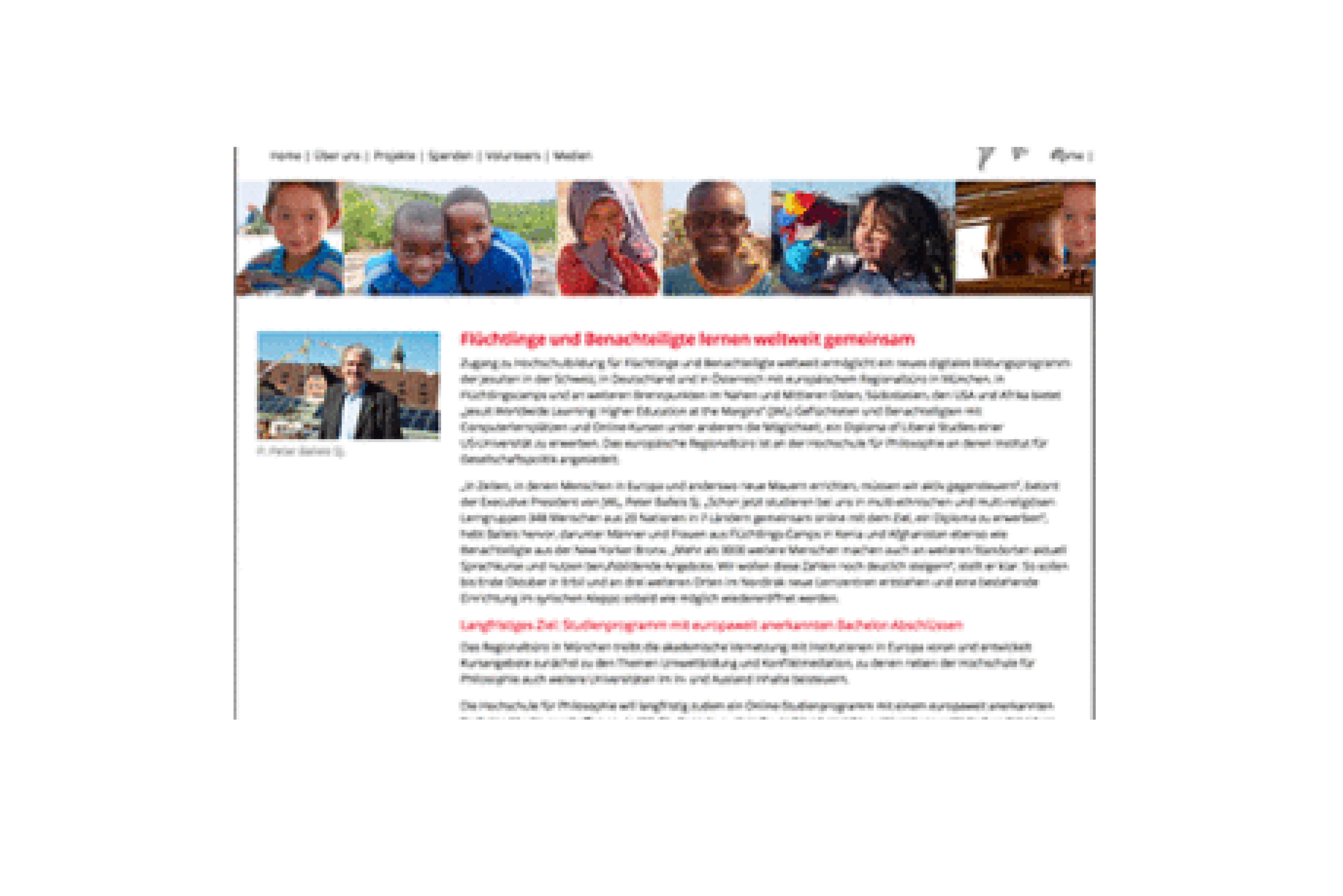Fr. Peter Balleis S.J. and JWL are highlighted in the German Jesuit Mission news letter
Refugees and disadvantaged learn together worldwide (Translated from German)

Refugees and disadvantaged learn together worldwide
Access to university education for refugees and disadvantaged world-wide enables a new digital education program of the Jesuits in Switzerland, Germany and Austria with a European regional office in Munich. “Jesuit Worldwide Learning: Higher Education at the Margins” (JWL) provides refugees and disadvantaged people with computer courses and online courses, among other things, the opportunity to obtain a diploma of “Refugee Camps” and other focal points in the Middle East, Southeast Asia, the USA and Africa Liberal Studies from a US university. The European Regional Office is located at the University of Philosophy at its Institute for Social Policy.
“In times when people are building new walls in Europe and elsewhere, we need to take an active role,” emphasizes the Executive President of JWL, Peter Balleis SJ. “Already, 348 people from 20 nations in 7 countries are studying together online with the aim of earning a diploma,” emphasizes Balleis, including men and women from refugee camps in Kenya and Afghanistan as well as disadvantaged people from the New York Bronx. “More than 3,000 more people are also making language courses at other locations and using vocational training courses. We want to significantly increase these figures, “he said. Thus, by the end of October in Erbil and three other places in the Northirak, new learning centers are to be established and an existing facility in Syrian Aleppo will be reopened as soon as possible.
Long-term goal: Study program with bachelor’s degrees recognized throughout Europe
The regional office in Munich is driving academic networking with institutions in Europe and is developing courses on environmental education and conflict mediation. In addition, the University of Philosophy also contributes other universities at home and abroad.
In the long term, the University of Philosophy also wants to create an online study program with a bachelor’s degree recognized across Europe, as well as to set up JWL locations in Germany. As Johannes Wallacher, President of the College of Philosophy and founding member of the JWL’s charitable foundation for the German Province of the Jesuits, makes clear, the necessary framework conditions are missing. “To make this vision a real opportunity for refugees and marginalized in Bavaria, the relevant political authorities must make the right decisions boldly,” he points out.
JWL is supported by international organizations, institutions and companies and is headquartered in Geneva, where the UN, WHO and UNHCR are also located. The project is a continuation of “JC: HEM”, the successful alliance of US Jesuit universities, which has been organizing study programs for refugees since 2010 in collaboration with the International Jesuit Refugee Service (JRS). JWL stands in the education tradition of the Jesuit Order and is addressed to people of every culture and religion.
Three questions to the Executive President of JWL, Peter Balleis SJ:
New name, new strategies? What distinguishes JWL from the predecessor program JC: HEM?
Peter Balleis: JC: HEM was founded in 2012 by two Jesuits and some laymen as a non-profit organization in the US. What began as a Jesuit initiative, not an explicit work of the Order, has rapidly evolved. Initially we were active in nine countries, soon became 20. The key principle for JWL is the collaboration with partners, which now manifests itself in a foundation of Jesuit US universities. A decisive step was also the move to Geneva, where many international organizations are located. We are now actually a work of the Order, the responsibility lies with the three German-speaking provinces. With “JWL” we have given ourselves a “straight-forward name” that fits our “forward strategy”.
What distinguishes JWL from other educational initiatives for crisis regions, such as “Mercy in Motion”, for which you once stood as a sponsor?
At JWL, it is not primarily about educating people for jobs, but actually about “Higher Education at the Margins”, which means higher education at the social edges of the world. In addition to certified language courses and further education programs, JWL offers Diploma of Liberal Arts, ie degrees which correspond to a US basic course. We want to train executives who stay in their countries of origin and make changes there. We’ve learned: Pre-Conflict work is better than post-conflict work. Our principle is ignitian pedagogy: analysis – reflection – acting.
How do the students find JWL?
JWL finds the students. The networking is very important, whether in a refugee camp in the Middle East or a ghetto in the New York Bronx. Our partners know the target group and address potential candidates. What often distinguishes and adapts people with escape backgrounds is their resilience: whoever has lost everything sometimes shows a completely different willingness to go through. No matter whether in Syria or the Bronx: it’s more than learning to bake bread, it is about learning critical thinking.
Further information on the pages of “Jesuit Worldwide Learning”, www.jwl.org
To read the original German text click here